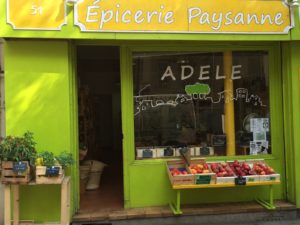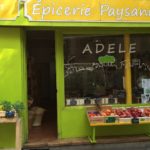01/1970

Filière Paysanne started in 2009 when Jean-Christophe Robert decided to create the first peasant grocery store (“Epicerie Paysanne”) in Marseille, which opened in 2010. The latter was transformed into a cooperative (SCOP) and sold to its employees in 2012. From 2013 to 2016, Filière Paysanne accompanied the creation of 4 new peasant grocery stores in the Bouches-du-Rhône Department. The association carries out other activities to support the development and operation of peasant grocery stores: training, setting up local supply platforms, policy advocacy, etc.
Στοιχεία επικοινωνίας
Jean-Christophe Robert
Λειτουργία / Οργάνωση : Head of Filière Paysanne
, Filière paysanne
E-mail : filiere.paysanne@gmail.com
Facebook : https://fr-fr.facebook.com/filierepaysanne/
δικτυακός τόπος : http://filiere-paysanne.blogspot.fr
E-mail : filiere.paysanne@gmail.com
Facebook : https://fr-fr.facebook.com/filierepaysanne/
δικτυακός τόπος : http://filiere-paysanne.blogspot.fr
Τοποθεσία
Marseille, Aix-en-Provence, France
Marseille, Aix-en-Provence, France
Ενδιαφερόμενα μέρη
- Peasant grocery stores (existing or in project)
- Farmers affiliated to ADEAR (Association for peasant agriculture), Peasant Confederation and InPACT PACA (Initiatives for a Citizen and Territorial Agriculture)
- SCOP Epice (cooperative) and Plate-forme Paysanne Locale for complementary supplies
- Regional Association for Local Development (ARDL) and MACIF Foundation
- Various departments and platforms of the Aix-Marseille University
- SUD Region, Bouches-du-Rhône Department, Aix Marseille Provence Metropole
Στόχοι
- Providing local farmers with a secure and profitable commercial outlet
- Offering urban consumers a practical and daily supply solution of quality food (organic or peasant) at an affordable price (fair margin principle)
- Creating meaningful jobs and economic security for the founders and employees of grocery stores thanks to a viable and tested model
- Raising consumers’ awareness on the importance of local agriculture as well as eating quality, fresh and seasonal products
Νομικό πλαίσιο & Προϋπολογισμός
Filière Paysanne is a citizen association. The first pilot grocery store had 5 employees, 3 of whom took over the store as a SCOP in 2013. Other stores have either associative or a private company status and represent in total 15 full-time equivalents (salaried or self-employed workers).Δραστηριότητες
Filière Paysanne coordinates a network of peasant grocery stores in cities and offers training for owners and project promoters as well as other support services. To date, member grocery stores supply around 5,000 households with local food from organic and peasant agriculture. Since 2012, the association has developed the Plateforme Paysanne Locale (Local Peasant Platform), a logistic platform which collects, pools, transports and delivers local agricultural products to public and private beneficiaries (collective catering, restaurants).>Καινοτομία & Αποτελέσματα
This innovative economic model is based on a specifically local supply and on the practice of fair margins, allowing the viability of grocery stores and an equitable sharing of the value between producers and retailers. The 5 grocery stores created or accompanied in the past 7 years generate an overall turnover of about € 2 million, more than half of which goes to local producers in the territory (approx. 500 tons of produce purchased). In addition, through collaboration with public and private actors of food distribution, the Local Peasant Platform allows for a better purchasing capacity and price.
Δημιουργούνται θέσεις εργασίας
15
15
Οι άνθρωποι πλησίασαν
5 000
5 000
Εμπόριο ανθρώπων
2 000 000
2 000 000
Κύρια εμπόδια & επόμενα βήματα
The development of this model is achieved through spin-off and training. The training programme costs € 2,000, which can hardly be self-financed by project promoters (mainly jobseekers). However, public funding is very difficult to access. So, the only option to date is to limit this training to those who can bear the cost. Filière Paysanne is preparing a communication plan to promote its training offer to potential store-owners at national level.Περισσότερα για :
http://filiere-paysanne.blogspot.fr








